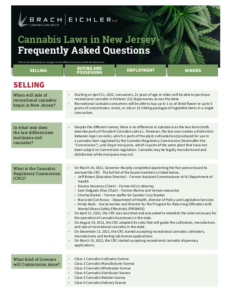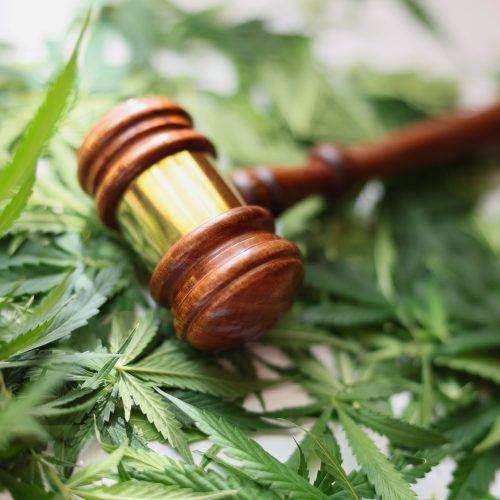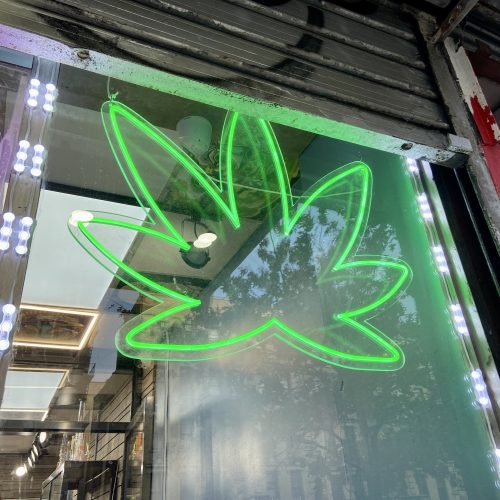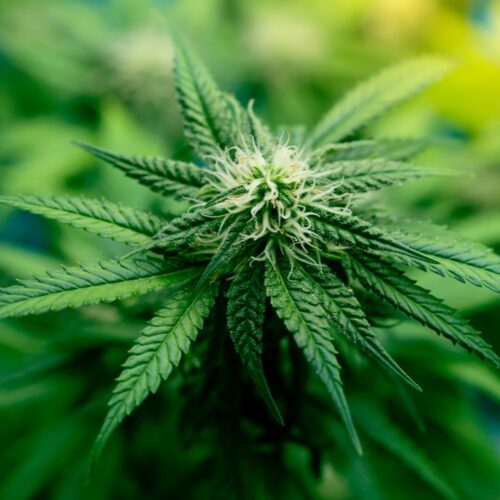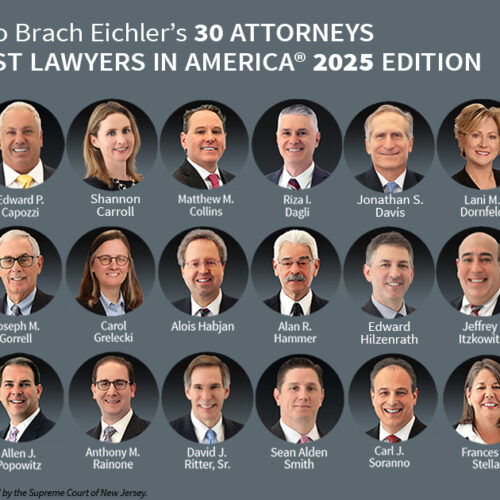Cannabis Laws in New Jersey – Frequently Asked Questions
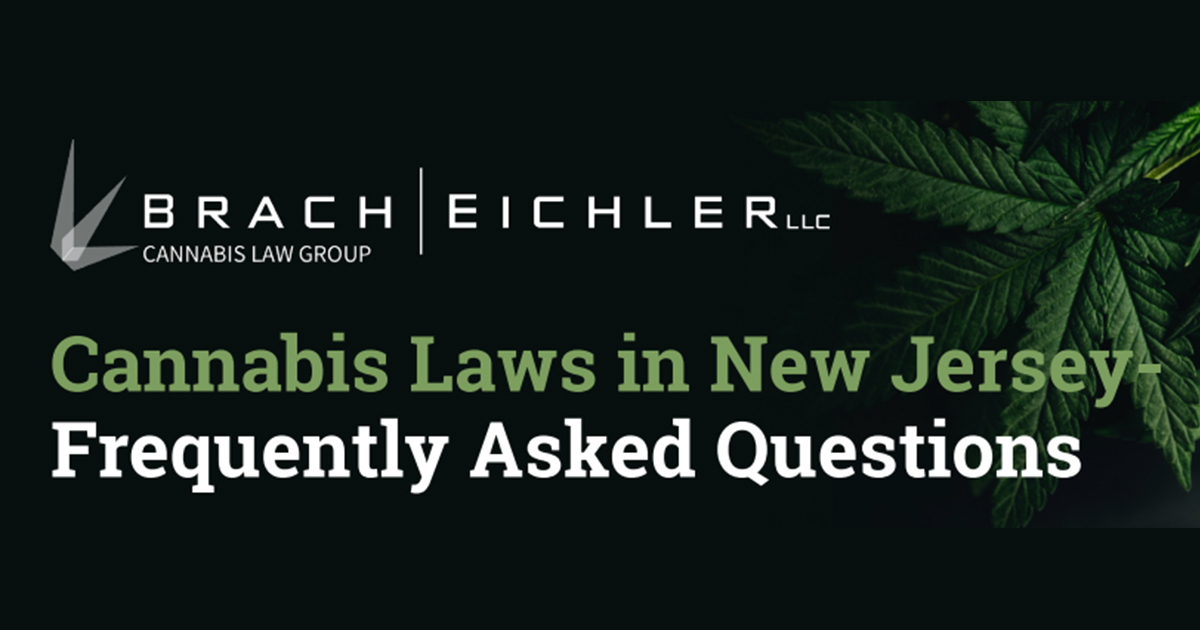
5/18/22
The rapidly developing Cannabis industry arising from laws permitting the use of medicinal cannabis, and, adult recreational use, brings with it a plethora of precedents yet to be set in the Garden State. This past April, the Cannabis Regulatory Commission met, kicking off the next steps in the long process of making legal cannabis sales a reality. Until the Commission adopts its rule and regulations, legal sales are on hold.
Brach Eichler receives numerous questions and inquiries regarding the current status of New Jersey cannabis sales, purchasing, consumption, and workplace regulations. To address your concerns, we have created Cannabis Laws in New Jersey – Frequently Asked Questions, a list of questions to keep you informed on the current state of affairs and policy developments in the cannabis industry.
Subscribe to our Cannabis Insights to receive the latest news and developments on the evolving New Jersey cannabis marketplace.
SELLING
-
When will sale of recreational cannabis begin in New Jersey?
- Starting on April 21, 2022, consumers, 21 years of age or older, will be able to purchase recreational cannabis in thirteen (13) dispensaries across the state.
- Recreational cannabis consumers will be able to buy up to 1 oz of dried flower or up to 5 grams of concentrates, resins, or oils or 10 100mg packages of ingestible items in a single transaction.
-
In what way does the law differentiate marijuana and cannabis?
- Despite the different names, there is no difference in substance as the two terms both describe parts of the plant Cannabis sativa L. However, the law now creates a distinction between legal cannabis, which is parts of the plant cultivated and produced for use in a cannabis item regulated by the Cannabis Regulatory Commission (hereinafter the “Commission”), and illegal marijuana, which is parts of the same plant that have not been subject to Commission regulation. Cannabis may be legally manufactured and distributed, while marijuana may not.
-
What is the Cannabis Regulatory Commission (CRC)?
- On March 24, 2021, Governor Murphy completed appointing the five-person board to oversee the CRC. The full list of the board members is listed below.
- Jeff Brown (Executive Director) – Former Assistant Commissioner at NJ Department of Health
- Dianna Houenou (Chair) – Former ACLU attorney
- Sam Delgado (Vice-Chair) – Former Marine and Verizon executive
- Charles Barker – Former staffer for Senator Cory Booker
- Maria Del Cid-Kosso – Department of Health, Director of Policy and Legislative Services
- Krista Nash – Social worker and Director for the Program for Returning Offenders with Mental Illness Safely Effectively (PROMISE)
- On April 12, 2021, the CRC was launched and was asked to establish the rules necessary for the operation of cannabis businesses in the state.
- On August 19, 2021, the CRC adopted its rules that will guide the cultivation, manufacture, and sale of recreational cannabis in the state.
- On December 13, 2021, the CRC started accepting recreational cannabis cultivators, manufactures and testing lab license applications.
- On March 15, 2022, the CRC started accepting recreational cannabis dispensary applications.
- On March 24, 2021, Governor Murphy completed appointing the five-person board to oversee the CRC. The full list of the board members is listed below.
-
What kind of licenses will Commission issue?
- Class 1 Cannabis Cultivator license
- Class 2 Cannabis Manufacturer license
- Class 3 Cannabis Wholesaler license
- Class 4 Cannabis Distributor license
- Class 5 Cannabis Retailer license
- Class 6 Cannabis Delivery license
-
What is the current status of the application process?
- On March 24, 2022: The CRC approved 68 conditional license applications for recreational cannabis cultivators and manufacturers.
- On April 18, 2022: The CRC approved another 34 conditional licenses for smaller cultivators and manufacturers to grow crops and build out their facilities. This brings the number of conditional licenses approved so far to 102.
-
What is a conditional license?
- A conditional license is a provisional award that gives the conditional license-holder a limited time to convert into an annual cannabis business license by satisfying all of the remaining requirements for full licensure. Conditional licensees have 120 days before they need to apply to convert to an annual license.
-
What are the tax differences between adult-use recreational cannabis and medical marijuana?
- The sale of adult-use cannabis will be subject to the normal state sales tax of 6.625%. Additionally, local governments may impose a 2% municipal tax if they want. Further, the Commission may institute a social equity excise tax at the cultivation level if it so chooses.
- For medical marijuana, sales tax imposed on sales will phase out over the next year as follow:
- 2% on sales made between July 1, 2021, and June 30, 2022
- 0% on sales made on and after July 1, 2022.
BUYING AND POSSESSING
-
So, can I buy Cannabis now in New Jersey?
- Starting on April 21, 2022, New Jersey residents and visitors 21 years and older will be able to purchase recreational cannabis and cannabis products at 13 dispensaries across the state.
-
Where can I legally purchase cannabis?
- New Jersey’s existing medical marijuana dispensaries, formally known as alternative treatment centers, will be given the first shot at sales since they are already equipped to do so. New dispensaries will follow.
- Starting April 21, 2022, the seven (7) alternative treatment centers are now clear to sell recreational cannabis at thirteen (13) retail dispensary locations listed below:
- North Jersey:
- Apothecarium, 1865 Springfield Ave., Maplewood
- Apothecarium, 55 South Main St., Phillipsburg
- Ascend Wellness, 174 Route 17 North, Rochelle Park
- RISE, 26-48 Bloomfield Ave., Bloomfield
- RISE, 196 3rd Ave., #3C, Paterson
- Central Jersey:
- Zen Leaf, 117 Sprint St., Elizabeth
- Zen Leaf, 3256 Brunswick Pike, Lawrence Township
- South Jersey:
- The Botanist, 100 Century Dr., Egg Harbor Township
- The Botanist, 2090 N Blackhorse Pike, Williamstown
- The Cannabist/Columbia Care, 1692 Clements Bridge Rd., Deptford
- The Cannabist/Columbia Care, 1062 North Delsea Drive, Vineland
- Curaleaf, 640 Creek Rd., Bellmawr
- Curaleaf, 4237 US-130 South, Edgewater Park
- North Jersey:
-
How much can I legally buy?
- Registered Patients: Registered patients may purchase up to 3.0 oz of medical cannabis or cannabis product from an alternative treatment center every 30 days, though the dosage is directed by the authorizing health care provider. Terminally ill patients are exempted from the maximum limits.
- Recreational Users: Recreational cannabis consumers (without a medical card) will be able to buy up to 1 oz of dried flower or up to 5 grams of concentrates, resins, or oils or 10 100mg packages of ingestible items in a single transaction.
-
Are edibles available to buy?
- Traditional food-based edibles are not currently included.
- Cannabis products are currently available as dried flower, concentrated oils, lozenges, and other chewable forms, pills, tablets, capsules. Drops and syrups, tinctures, and topical, transdermal, and sublingual forms are available.
-
Is it legal to possess cannabis in New Jersey?
- In November of 2020, the state constitution was amended to legalize the recreational use of marijuana for adults aged 21 and older. The new law removed criminal and civil penalties for possession of up to 6 oz for adults 21 and over. The constitutional amendment took effect on January 1, 2021.
-
How much cannabis can I legally possess?
- Individual adults may legally possess up to 6 oz of marijuana, including any adulterants or dilutants, or up to 17 grams of hashish.
-
What is Hashish?
- Hashish means the resin extracted from any part of the plant Cannabis sativa L. Under the new laws, marijuana and hashish are still defined as “controlled dangerous substances” but are largely decriminalized for non-distribution offenses. The laws eliminate existing prohibitions and create new, more lenient penalties for possessions and distribution that remain tiered based on weight. Individual adults may legally possess up to 17 grams of hashish.
-
Can I give cannabis as a gift?
- You can gift another adult 21 years of age or older up to 1 oz.
-
Can I get cannabis delivered to me?
- Once dispensaries are open to the public, the state will also license delivery drivers to bring marijuana directly to customers.
-
Can a municipality restrict cannabis delivery services in their jurisdiction?
- A municipality can restrict cannabis delivery service businesses, but in no case may a municipality restrict the transportation or delivery of cannabis items within the municipality. Any such restriction shall be deemed void and unenforceable.
-
Can I buy cannabis out-of-state where it is legally sold and bring it back to New Jersey?
- Legally produced marijuana must stay within the state where it was grown. Marijuana remains illegal at the federal level, and so does transporting it over state lines. Also, it would be illegal to get cannabis shipped from out of state.
-
Can out-of-state residents buy cannabis in New Jersey and take it back with them?
- Out-of-state residents who buy in New Jersey cannot legally take it back home, due to federal prohibition that blocks interstate travel with marijuana. Legal cannabis purchased in New Jersey should also be consumed in New Jersey.
-
Can you drive with marijuana?
- Driving under the influence of marijuana is illegal. However, possessing up to 6 oz of marijuana or up to 17 grams of hashish in a car will fall under the same rules as possession as long as the driver is not consuming it.
-
Can police officers search my car based on the smell of cannabis?
- The odor of cannabis, either burnt or raw, by itself no longer constitutes “reasonable suspicion” to justify a continued stop of an individual under the age of 21, nor does it provide “probable cause” to search the person’s personal property or vehicle.
-
Where can you smoke cannabis?
- Smoking or using cannabis in public places will be prohibited. Recreational cannabis can only be consumed in a private residency. However, the new law will allow the Commission to designate consumption areas or consumption lounges in the future. The endorsement of consumption area will be conditioned upon approval by a municipality.
- Consumption area means a designated location operated by a licensed cannabis retailer or permit holder for dispensing medical cannabis, for which both a State and local endorsement has been obtained, that is either:
- an indoor structurally enclosed area of the cannabis retailer or permit holder that is separate from the area in which retail sales of cannabis items or the dispensing of medical cannabis occurs; or
- an exterior structure on the same premises as the cannabis retailer or permit holder, either separate from or connected to the cannabis retailer or permit holder, at which cannabis items or medical cannabis either obtained from the retailer or permit holder or brought by a person to the consumption area, may be consumed.
- 20% of the guest rooms of a hotel, motel, or other lodging establishments would be permitted by the person or entity that owns or controls that establishment.
-
Where is cannabis prohibited?
- For consumption, the smoking, vaping, or aerosolizing of a cannabis item would be prohibited in any place under law that prohibits the smoking of tobacco, as well as any “indoor public place” as defined in the New Jersey Smoke-Free Air Act.
- Indoor public places include:
- Workplace;
- Public parks or beaches;
- Outdoor passenger pick-up and drop off area;
- Airport; and
- Any area of any building of, or on the grounds of, any public or nonpublic elementary or secondary school.
- Smoking, vaping, or aerosolizing cannabis could also be prohibited in:
- Private multifamily housing, as decided by the person or entity that owns or controls the housing;
- The structure or specific units within the structure of a cooperative by the corporation or other legal entity that owns the structure; and
- The units of a condominium, if approved by its association and a majority of all of the unit owners.
-
Can I grow cannabis plants at home in New Jersey?
- Personal cultivation of both medical marijuana and recreational cannabis is illegal in New Jersey. Cultivation or Manufacturing requires a license and is for commercial uses only.
- Note: On March 22, 2021, a new bill (S3582) was introduced that would allow anyone 21 and older to grow up to six marijuana plants at home, with a maximum of 12 plants per household. Also, medical patients could grow up to 10 plants. Currently, growing five plants or less can result in three to five years in prison and a $25,000 fine. Brach Eichler will continue to update the FAQ once we find out the bill gets passed or denied. (Last updated April 20, 2022)
-
What are the major differences between adult-use recreational cannabis and medical marijuana?
- Consumer Considerations & Patient Registration
- Adult-use recreational: 21 years of age
- Medical marijuana: Medical conditions; Required physician registration
- Prescription Quantities & Patient Possession
- Adult-use recreational: 1 oz
- Medical marijuana: up to 3 oz per month
- Means of Legal Change
- Adult-use recreational: Referendum followed by normal regulative action
- Medical marijuana: Normal legislative action
- Consumer Considerations & Patient Registration
EMPLOYMENT
-
Can an employer fire employee for cannabis consumption?
- An employer would not be permitted to refuse to hire or employ a person, or discharge or take any adverse action against an employee because that person or employee does or does not use cannabis items.
- Under the new law, the presence of the cannabinoid metabolites in the body of a person engaged in permitted conduct outside of work, could not form the basis for refusal to employ or otherwise penalize that person.
- However, an Employer may terminate or refuse to hire an employee who uses cannabis if it would violate the terms of a federal contract or cause the employer to lose federal funding.
-
Can an employer require an employee to undergo a drug test?
- An employer may require the employee to undergo a drug test when:
- Upon reasonable suspicion of an employee’s usage of a cannabis item while engaged in the performance of the employee’s work responsibilities;
- Upon finding any observable signs of intoxication-related to the usage of a cannabis item;
- Following a work-related accident subject to investigation by the employer;
- Random drug testing;
- Testing as part of pre-employment screening; or
- Regular screening of current employees to determine use during an employee’s prescribed work hours.
- Questions about your employer’s policies on drug testing and how they apply to you should be directed to your human resources department and/or a lawyer specializing in employment law.
- An employer may require the employee to undergo a drug test when:
MINORS
-
What happens when my child under 21 gets caught for either possessing or consuming marijuana?
- First Offense: The new law goes away with arrests and fines for those younger than 21 caught with possessing or consuming marijuana. Instead, young people will receive warnings that escalate. Upon a first offense, they will get a written warning for a first offense. The cleanup bill (S3565) that was signed into law on March 26, 2021, requiring law enforcement to provide written notification to the parent or guardian of a person under age 18 who commits a first offense of unlawfully possessing or consuming cannabis, marijuana, or hashish.
- Second Offense: Those younger than 21 caught a second time smoking marijuana or possessing marijuana will get another written warning, along with materials on community drug treatment services. For individuals under the age of 18, the officer shall provide the individual’s parent or guardian with copies of the warning’s issues for both the first and second offenses.
- Third or Subsequent Offense: Getting caught with such items for the third time or more means another written warning and more information on community drug treatment services. The written warning also will get sent to the community drug treatment program, for people between 18 and 21; while parents or guardians get copies of the following warning for those younger than 18.
- For those younger than 21, possession of more than 6 oz of marijuana or 17 grams of hashish still is a fourth-degree crime and may be issued a complaint summons and fingerprinted at their first court appearance.
-
Can my child under 21 get arrested for refusing to provide identifying information for the written warning or putting the marijuana in their pocket or concealing it in some way?
- Initially, the officer should take reasonable efforts to explain the situation to the underage individual if the underage individual refused to give their identifying information.
- If the underage individual continues to refuse, the law does not allow for the underage individual to be placed under arrest or taken into custody, unless the individual has engaged in some affirmative act of interference with the officer; simply refusing to turn over the marijuana does not constitute an affirmative act.
New Jersey cannabis law will continue to evolve and Brach Eichler will make sure to continue to provide our clients with the most up-to-date information.
This document is intended for informational and discussion purposes only. The information contained in this document is not intended to provide, and does not constitute legal advice or establish the attorney/client relationship by way of any information contained herein. Brach Eichler LLC does not guarantee the accuracy, completeness, usefulness or adequacy of any information contained herein. Readers are advised to consult with a qualified attorney concerning the specifics of a particular situation.


